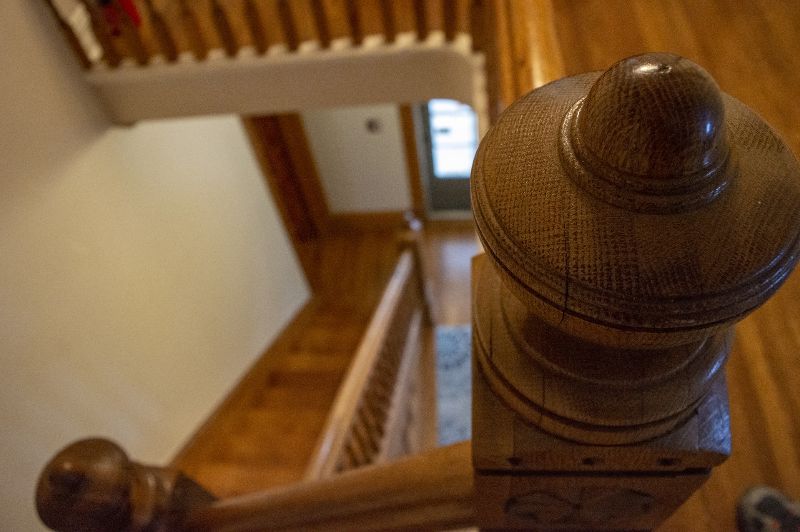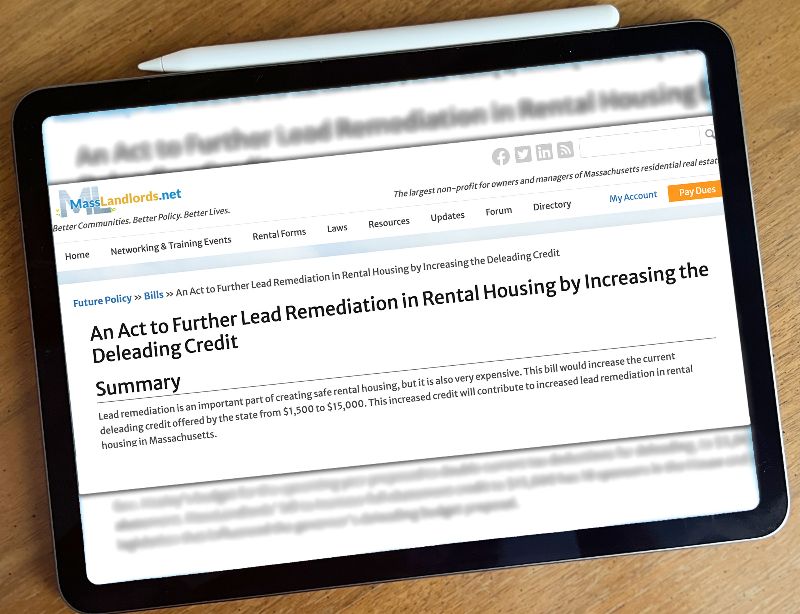It’s a Start: State’s Deleading Tax Credit Doubles to $3,000
. Posted in News - 3 Comments
By Eric Weld, MassLandlords, Inc.
In an incremental move forward, Gov. Maura Healey recently signed into law a tax credit for deleading a home that doubles the allotted credit amount from $1,500 to $3,000. That’s not saying much, but it’s a small step in the right direction.

If your properties were built before 1978 and have never been deleaded, chances are staircase railings and newels, window frames and sills, and walls and baseboards were painted and/or finished with lead-filled products. Even clear varnish like this can contain lead, especially if it's original 19th century product. That means potential poison in the air that can be especially harmful to children. A tax credit of $3,000 is available for deleading dwellings in Massachusetts.
There’s no question MassLandlords’ actions were largely responsible for this change. We proposed a bill in January 2023 to the 193rd state legislature, urging them to increase the deleading credit 10 times, from $1,500 to $15,000. The bill attracted strong support among legislators, with 18 House and Senate sponsors. To the best of our knowledge, no one had filed a bill to increase the deleading credit in the past decade.
Likely responding to the legislative support for an increased deleading tax credit, the governor included a doubling of the credit in her fiscal year 2024 budget proposal. That provision was not part of the FY2024 budget signed by the governor in August 2023.
However, on Oct. 4, the governor enacted legislation that will now allow up to $3,000 in tax credit for deleading a dwelling. The tax credit is retroactive, with an effective date of Jan. 1, 2023. To qualify, a home must be compliant with the law’s requirements. Following lead abatement, a licensed inspector must confirm the successful removal of dangerous lead levels.

MassLandlords’ bill proposal to the 193rd legislature urged an increase in the tax credit for deleading a dwelling from $1,500 to $15,000. The bill, which had strong legislative support, likely influenced the Gov. Maura Healey’s recent signing of a law doubling the deleading tax credit to $3,000.
More Needed for Deleading Incentive
The governor’s signing of the deleading tax credit increase marks the first time in 19 years that Massachusetts landlords have directed the passage of a law. In 2004, landlords’ collective influence helped pass a law requiring the installation of water submeters and low-flow devices in order to charge tenants separately for water usage. MassLandlords’ proposals during the coronavirus pandemic resulted in important policy changes, including allowing landlords to apply for RAFT on behalf of their renters.
Unfortunately, the governor’s doubling of the deleading tax credit woefully underserves the need. It’s something, but much more is needed. Until this year, the tax credit for deleading a dwelling was $1,500, an antiquated amount. A $1,500 credit might have provided an incentive to delead back in 1993 when Massachusetts upped the credit to that amount from $1,000. Now, it’s an amount that hardly encourages property owners to make this important renovation.
Today’s cost of deleading far surpasses the new law’s tax break. The average price to remove lead from a dwelling is $6,000. But if windows are included, it can shoot as high as $15,000. Massachusetts hosts more than 3 million homes (around 1 million are renter-occupied), with more than 2 million built before 1978, when the use of lead paint was illegalized. Before that year, window frames and sills were typically painted or finished with lead-based products. Picture your typical triple decker, which has some 50 windows. Deleading such a dwelling is a costly, highly disruptive renovation that often requires residents to move out temporarily. A $3,000 tax credit leaves many owners paying well over $10,000 for the job.
No wonder only about 10% of Massachusetts dwellings are deleaded. The governor’s doubling of the tax credit for deleading, the first increase in 30 years, may result in a small boost in the state’s deleading rate.
Dealeading Law Requirements
In order to receive the $3,000 tax credit, a dwelling must show compliance with the law. That means, as part of the abatement, obtaining a letter of full deleading compliance from a licensed inspector stating that the lead hazard has been removed or contained in all accessible areas. The letter must be filed by the property owner with the state Department of Revenue for a credit applied to state taxes.
The law also provides a partial incentive for interim lead control. This provision allows up to $1,000 in tax credit for owners who conduct interim lead-control measures as a step toward full abatement. Interim controls are designed to address and stabilize urgent lead exposure issues, such as repainting peeling paint, or cleaning and treating exposed areas from which lead dust could be loosened by rubbing against it. The interim credit is applicable to half the cost of deleading measures, and is subtracted from the full deleading credit when that is completed.
Deleading: A Front-Burner Issue and Good Investment
Massachusetts was once a deleading pioneer. It was among the first states in the nation to pass a deleading law, in 1971. That law remains on the books. It requires property owners to remediate lead hazards from any dwelling in which a child 6 years old or younger will reside.
The law was amended in 1987. One of the amendments included the addition of a tax incentive, of $1,000 (raised to $1,500 in 1993) to support owners’ deleading costs.
With no updates in the past 30 years, Massachusetts’ deleading law has fallen far short of its intention. Some 450,000 rental units remain hazardous due to presence of lead, according to our estimates. About 7,000 units are deleaded per year. At the current rate, it will be 2170 by the time the state becomes lead free.
Meanwhile, thousands of children will be exposed to lead and may experience mild to extreme effects of lead poisoning. Symptoms of lead poisoning are both acute and long-lasting, and can affect people’s lives in countless unrealized ways. Immediate symptoms can include headaches, stomach cramps, digestive issues, insomnia and exhaustion. Longer term, lead poisoning can lead to reproductive issues, kidney problems, high blood pressure and cognitive underdevelopment. Lead poisoning has been linked to such outcomes as relatively poor academic performance, lower lifetime income, mental instability and increased violent crime.
In other words, lead poisoning is an issue of urgency that current policy does not match.
Still, even with a tax credit at the $3,000 level, our deleading advocacy has provided a good investment for members. At the current rate of 7,000 dwellings deleaded per year (times $3,000 each), that’s another $10 million of public money available for deleading. Ultimately, such a boost in available funds (with a percentage realized by our members) could significantly support our mission to create better rental housing.
This deleading tax credit demonstrates our success in lobbying for policy changes helpful to landlords. With more resources, our lobbying power would multiply.
Doubling the tax credit for deleading is a start. We will continue lobbying for more policy that helps landlords provide better rentals.





Hopefully these issues will be quickly resolved, so we can feel more secure about the economic situation
It’s encouraging to see the state’s deleading tax credit doubling to $3,000. This can potentially make a significant impact in promoting lead-free environments, ensuring the safety of our communities. It’s a positive step towards encouraging homeowners to address lead-related issues
It’s a start.. deleading is a huge investment in the property with no real financial return .. you might get more when you sell and it does provide some legal protection but more incentive is needed… the government wonders why more owners are not getting units inspected and deleaded while at the same time proposing rent control again …. Sorry to go on a rant but private property rights in this state are on the way out ..not to say tenants don’t deserve to have rights but we all know how this state views landlords. .. we should start using the term housing providers because that’s what we do ..